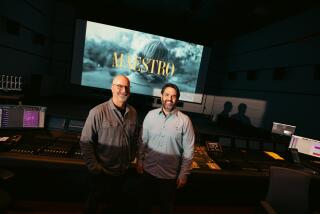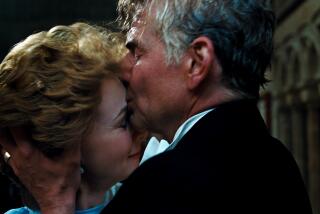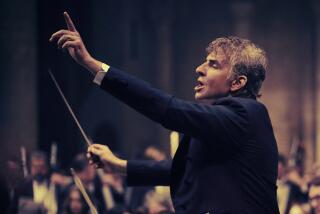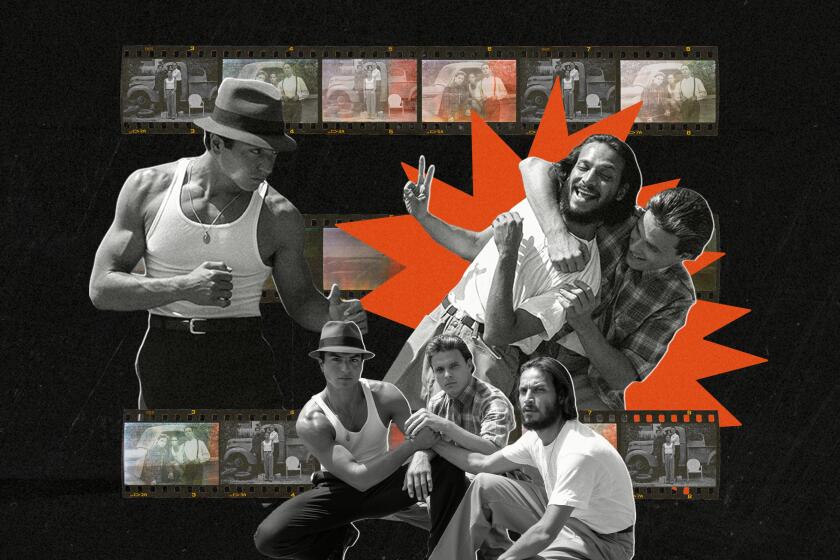Composers help tell the story and set the scene
When a movie has little dialogue and even fewer sound effects, what keeps the audience tethered emotionally to the story? And how can a film seamlessly blend the idea of death and a child’s wide-eyed wonderment? Through its music, of course. Here are four composers whose work covers all of the above as well as a solemn spirituality and a playful pizazz.
JOHN WILLIAMS, ‘The Book Thief’
After nearly a decade of composing exclusively for Steven Spielberg’s often-epic films, five-time Oscar winner John Williams took on the gentle Holocaust-era drama “The Book Thief.”
“It was not a hard decision for me at all because I’d never confronted this combination of ideas in a book or play in my lifetime,” says the 81-year-old Williams. “There’s a double track: Literature, words and writing offer solace and immortality; the other side of the track is the Voice of Death, which I call ‘Providence,’ and that track also offers solace and immortality. These are two powerful notions that are highly original and poetic subjects for music to deal with.”
VIDEO: Highlights from the Envelope Screening Series
The second-most nominated person in Oscar history with 48 nods, Williams is known for some of cinema’s most iconic music, from the dark majesty of the Imperial March of the “Star Wars” series and the dread-generating double bass in “Jaws,” to his fanfares for the “Superman” and “Indiana Jones” movies. His task on “The Book Thief,” the story of a young girl who discovers a love of reading in World War II Germany, was relatively delicate.
Williams says he and director Brian Percival (“Downton Abbey”) agreed “the film should be reflective of beautiful things. I think it is that.”
The composer dotted scenes with fragile piano notes and bolstered the film’s ideas with recurring motifs.
“The first one is a theme that accompanies the Voice — of Providence, if we’re to call it that. We hear it three or four times, when he speaks. So that’s what you hear at the end but it’s been resolved musically.”
One of the others, he says, was “the result of conversations with Brian about magic or magnetism — a motif, if not a melody — that is presented most importantly when [the girl] goes to Elsa’s library and sees all the books. It’s a magical moment for her.”
Percival says, “Some of us are lucky enough in our lives that somebody has an effect on us — the world opens up to you and anything is possible. To convey that in just a few notes, I don’t understand it. It did everything I’d hoped for.”
—Michael Ordona
STEVEN PRICE, ‘Gravity’
“Every cue was a big experiment,” says composer Steven Price of his gigantic, aurally astonishing score for “Gravity,” director Alfonso Cuarón’s 3-D outer space disaster film. The galaxy offered an enormous, soundless black canvas — his task was to be equal to it as he guided the viewer emotionally.
TIMELINE: The Academy Awards through the years
“My role was to be very much with [astronaut] Ryan Stone from the start — expressing her state of mind, whether she’s panicked, desperate, lonely, overwhelmed,” says Price, who also recently scored the Earth-bound British comedy “The World’s End.” Given the absence of sound waves in space, Cuarón had ruled out percussion instruments, so Price achieved menace and muscle with “Jaws”-like pulsing, percussive bowing and other unnerving effects, and ethereal wonder via glass harmonica and choir. “Every element was manipulated through a synthesizer so that you’re never sure what’s organic and what’s electronic,” says Price. “We were very keen to avoid the conventions of a typical action score.”
The recording method was innovative too. “We mixed it to be immersive, as if things were moving and transforming around you in an untethered way,” Price explains. A creative breakthrough came on the cue titled “Don’t Let Go,” which plays as Stone (Sandra Bullock) gets separated from Matt (George Clooney), the other astronaut who survived the debris storm.
“I was trying to write emotional music but none of the conventional instruments were cutting it,” says Price. “I spent a full day throwing ideas at it — then I got a cello and played it through a guitar tremolo pedal. It had a fluttering effect, which really got the melody going. It was the start of what became Ryan’s theme, which you experience in its fullest version at the end of the film.”
Another striking effect: the loud, intense “zzzzzip!,” followed by silence, that occurs near the beginning and again at the end of the score. “You don’t realize how silent something is,” says Price, “unless there’s a big noise before it. This was the most extreme example of that idea we could create.”
— Amy Dawes
HANS ZIMMER, ’12 Years a Slave’
Hans Zimmer says he was so moved by “12 Years a Slave” that when director Steve McQueen asked him to score it, he wasn’t sure he was the right choice. “It was the questions that tumble through a neurotic German mind,” he confesses. “Am I up to it? Am I worthy? Do I have anything to say?”
INTERACTIVE: Best and worst Oscar moments since 2008
In the end, he approached it in the humblest possible way, assembling an intimate group of four string players from among his friends, and recording at his home studio with McQueen present. “It was just friends talking about the story and trying out ideas,” says Zimmer. “And Steve was conducting us with his body language, or a smile, or the glint in his eye.”
The cello-led theme for the kidnapped Solomon Northup that recurs throughout the score has a somber spiritual grandeur that serves to elevate scenes while scarcely intruding. “The job of the music is to open the door and invite you in,” says Zimmer, “not to tell you what to feel. When I saw the performances these actors are giving I wanted to leave enough space to experience that.”
The movie’s traditional songs and spirituals were laid in before he began — violinist Tim Fain (“Black Swan”) performs the music of fiddle-player Solomon (Chiwetel Ejiofor) — freeing Zimmer from period constraints. “My music could be a bridge to the present, and this was important because for years I’ve been obsessed about how much slavery still exists in the world.”
Stripped-down sounds evoked the plantation’s natural world: the high-pitched singing of insects, done with violins and synthesizer; the tension of an escape, via a wood block beaten harshly with a stick. Zimmer’s instinct was to be experimental, to “create situations where anything could occur.” One example: When Solomon tries to write the letter that could lead to his freedom, cellist Tristan Schulze began to hum deeply, adding a moving, spiritual element to his playing that Zimmer preserved in the recording.
“Because Solomon is a musician, Steve asked us what we as musicians would do in a difficult circumstance. That was easy — I got into music because it was a refuge for me,” says Zimmer. “Music for a musician is salvation.”
—Amy Dawes
THOMAS NEWMAN, ‘Saving Mr. Banks’
Music plays a big role in “Saving Mr. Banks.” The scenes that show brothers Richard and Robert Sherman working out their iconic tunes for Disney’s movie musical “Mary Poppins” are among its most delightful. As much as he loves songs like “Chim Chim Cheree” and “Feed the Birds,” composer Thomas Newman says his original score contains almost no quotations.
“The movie takes place in two periods — 1961 in Los Angeles and 1906 in rural Australia. The majority of my contribution is toward telling the back story — who [‘Poppins’ author] P.L. Travers was as a child, her relationship with her father, and the emotional themes and issues that carry over to the time when she visits L.A.”
Some of his most spirited and slyly funny music accompanies the author’s arrival in America — she’s chauffeured around Beverly Hills in a limousine to the sounds of a pizazz-laden jazz combo of piano, drums and trombone. “It’s a little ridiculous, because I’m poking fun,” says Newman. “Here’s this very proper Englishwoman who’s appalled at what she’s seeing in L.A.” Another cue, introducing Walt Disney himself, is all brio and brassy, upbeat excitement, meant, says Newman, to express “a very archetypal American character.”
The chance to spend time with fellow composer and Disney veteran Richard Sherman, now 85, when he attended a recording session on the Fox lot was a highlight for Newman. “Sherman was a master of three-quarter waltz time, so in tribute, I used a waltz theme that I brought up when things in the back story hinted at ‘Mary Poppins,’ like when the aunt who looks so much like her arrives for a visit.”
Despite his many accomplishments — his previous scores have landed 11 Academy Award nominations —Newman, the youngest son of the late film composer Alfred Newman, says he strives to create in a relatively ego-free way.
“The fun for me musically is that you never quite know what works and why. So why pretend you do? Why not just put things together and discover, in the creative process, if and why they work? That approach has served me well.”
—Amy Dawes
MORE OSCAR COVERAGE
WINNING BALLOT: A list of the 2013 winners
TIMELINE: Academy Awards through the years
More to Read
Only good movies
Get the Indie Focus newsletter, Mark Olsen's weekly guide to the world of cinema.
You may occasionally receive promotional content from the Los Angeles Times.






